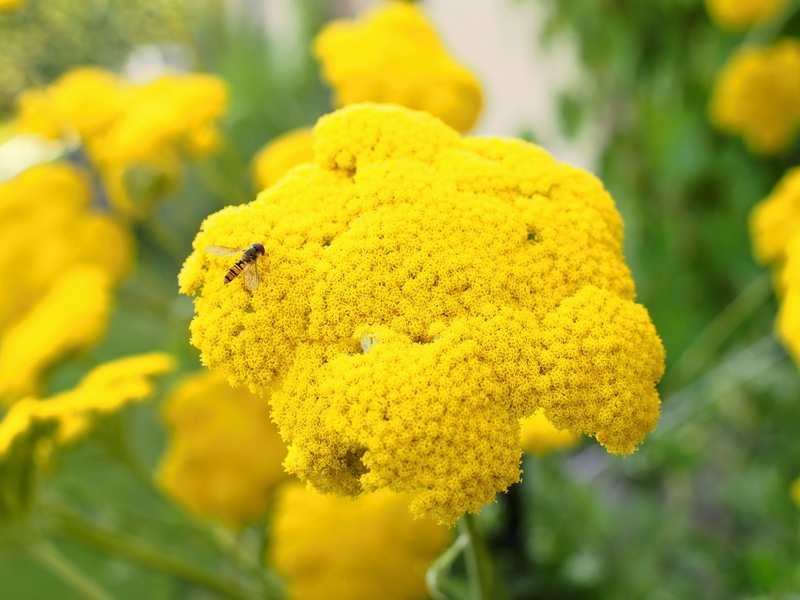Nurturing the Earth: From Waste to Wonder-Soil
Posted on 07/09/2025
Nurturing the Earth: From Waste to Wonder-Soil
Nurturing the Earth is more than just a responsibility--it's an opportunity to transform our world for the better. One remarkable way we can do this is by transforming everyday waste into nutrient-rich, fertile soil. This process, often called creating "wonder-soil," is pivotal for sustainable agriculture, environmental health, and ensuring a green legacy for future generations.

Understanding the Cycle: From Waste to Wonder-Soil
The journey from waste to wonder-soil lies at the heart of sustainable living. Every day, households and industries produce tons of organic waste. Instead of sending it to overflowing landfills, this waste can be converted into beautiful, nutrient-laden soil--the kind that breathes new life into ecosystems.
What Is Wonder-Soil?
Wonder-soil is not just any dirt--it's the result of a carefully orchestrated process that turns kitchen scraps, yard clippings, and other organic refuse into a powerful growth medium. This soil is teeming with beneficial microbes, micronutrients, and humus that support plant life, retain moisture, and regenerate the earth.
The Environmental Imperative
Every piece of waste that we compost instead of discarding reduces greenhouse gas emissions, minimizes landfill usage, and preserves valuable resources. Turning waste into wonder-soil is an actionable method of nurturing the earth from your own backyard.
Benefits of Transforming Waste into Wonder-Soil
Converting organic waste into rich, fertile soil offers a wide array of environmental, economic, and social benefits:
- Enriching soil health: Wonder-soil boosts fertility thanks to its nutrient content.
- Reducing landfill burden: Less organic matter means smaller, more manageable landfills.
- Lowering greenhouse emissions: Composting curbs the release of methane, a harmful greenhouse gas.
- Improving plant growth: Healthier soil leads to more productive gardens and farms.
- Supporting biodiversity: Rich soil supports worms, insects, and microorganisms.
- Water conservation: Enhanced soil structure retains moisture, reducing the need for irrigation.
The Science Behind Soil Transformation
Turning waste into wonder-soil isn't magic--it's a natural process, powered by decomposition and microbial activity. Let's take a look at the key actors:
The Role of Microorganisms
Fungi, bacteria, and other microbes break down organic material, releasing nutrients in a form that plants can easily absorb. Through their efforts, what was once considered "waste" becomes vital nourishment for new plant life.
Compost Chemistry: The Recipe for Wonder-Soil
The secret to effective composting--and thus, nurturing the earth--lies in balancing carbon-rich ("browns") and nitrogen-rich ("greens") materials.
- Browns: Dried leaves, straw, cardboard, and wood chips.
- Greens: Vegetable scraps, coffee grounds, fresh grass clippings.
By maintaining a healthy ratio (typically about three parts browns to one part greens), the compost pile heats up and breaks down swiftly.
How to Transform Waste into Wonder-Soil at Home
Anyone can participate in nurturing the earth through home composting. Here's how to begin the incredible transformation:
Step 1: Collect Your Waste
- Kitchen scraps: Fruit & veggie peels, coffee grounds, eggshells.
- Yard waste: Grass clippings, leaves, small prunings.
- Papers: Uncoated napkins, shredded paper (use sparingly).
Avoid dairy, meat, oils, and pet waste, as these attract pests and slow down decomposition.
Step 2: Choose Your Composting Method
- Pile or Bin: Ideal for backyard gardeners; requires space and regular turning.
- Vermiculture: Uses worms to process scraps (great for apartment dwellers).
- Bokashi: Fermentation-based; works well indoors and accepts diverse kitchen scraps.
Step 3: Monitor and Maintain
- Ensure aeration by turning the pile every week or so.
- Monitor moisture. Compost should feel like a wrung-out sponge--add water or dry material as needed.
- Watch temperature. Active compost should feel warm in the center, signaling microbial activity.
Step 4: Harvest Your Wonder-Soil
Finished compost is dark, crumbly, and smells like earth. Sift out any large bits for another round of composting, and apply the rest to your gardens, lawns, or indoor plants.
Sustainable Agriculture: Wonder-Soil's Role in Food Security
Healthy, robust soil is the foundation of resilient agriculture. Wonder-soil, derived from locally sourced organic waste, improves food production in several transformative ways:
- Boosts yield: By supplying balanced nutrition, compost-enhanced soil increases plant vigor and output.
- Reduces dependency: Farmers use fewer chemical fertilizers, saving resources and minimizing environmental harm.
- Mitigates erosion: Wonder-soil binds particles and prevents erosion, safeguarding arable land.
These qualities highlight why nurturing the earth--especially through converting waste into wonder-soil--will be crucial to feeding our growing global population.
Urban Gardening and Community Green Spaces
In cities, the movement to nurture the earth through composting and enriching green spaces is gathering momentum. Community gardens flourish as neighbors transform food waste into assets. This not only provides access to fresh produce, but also creates valuable educational opportunities for children and adults alike.
Beyond Compost: Innovations in Soil Regeneration
Modern science is expanding the tools available for turning waste into wonder-soil:
- Biochar: Charred organic waste locks carbon into the soil, increases fertility, and improves water retention.
- Mycoremediation: Fungi break down toxins in contaminated soils while building biomass that enriches future soil quality.
- Compost teas: Liquid extracts of compost are sprayed onto crops to supercharge soil microbes and plant immunity.
These advancements are making it easier than ever to participate in nurturing the earth, improving soil quality, and fighting climate change.
Challenges and Solutions in the Waste-to-Wonder-Soil Journey
While the benefits are profound, there are also real challenges to nurturing the earth this way. Understanding them helps communities form resilient, effective solutions:
- Contamination: Mixing plastics or chemicals in compost can harm soil health. Solution: Public education and source separation are key.
- Participation rates: Not everyone composts. Solution: Municipal composting programs make it easier for households to contribute.
- Space constraints: City dwellers may lack room for traditional bins. Solution: Compact vermiculture bins or community drop-off points offer alternatives.
Policy and Community Engagement
Local governments play a vital role in nurturing the earth at scale. Successful municipal composting programs divert thousands of tons of organic waste. Educational campaigns also empower individuals to adopt waste-to-soil strategies at home.
How You Can Help Nurture the Earth--Starting Today
Everyone can be a steward of the earth and participate in the wonder-soil movement. Whether at home, in schools, or by supporting community programs, your efforts matter. Follow these tips to make a difference:
- Compost at home: Choose a method that suits your space and lifestyle.
- Support local farmers: Purchase from growers who build soil health with organic waste.
- Get involved: Volunteer at community gardens or composting initiatives.
- Advocate: Encourage municipal leaders to invest in waste-to-soil infrastructure.
- Reduce food waste: Plan meals, repurpose leftovers, and recycle what you can.
Inspire others by sharing your story! Teach children and peers how nurturing the earth leads to greener neighborhoods, cleaner air, and healthier food.
Looking Forward: A Greener, More Sustainable Future
The transition from waste to wonder-soil is not just a practical solution for today--it's an investment in the wellbeing of tomorrow's planet. As we shift our thinking from "trash" to "resource," we embrace the challenge of nurturing the earth and rebuilding soil health worldwide.
In every pile of compost, there's a story of renewal, hope, and environmental stewardship. Best of all, anyone can be a part of this solution.
Final Thoughts on Wonder-Soil and Nurturing the Earth
From waste to wonder-soil, we hold the keys to a sustainable revolution. By acting locally, educating others, and supporting policies that embrace organics recycling and composting, we build a green legacy that benefits everyone. Start nurturing the earth today--watch how nature turns your waste into its greatest asset.

Frequently Asked Questions: Waste to Wonder-Soil
- Does composting work in small spaces? Yes! Vermiculture bins and bokashi systems are ideal for apartments, schools, and offices.
- How long does it take to produce wonder-soil? Typically, well-managed compost can be ready in 2-6 months. Variables include temperature, humidity, and the mix of browns and greens.
- Can wonder-soil replace chemical fertilizers? In many cases, yes. Healthy compost provides a broad spectrum of nutrients and promotes long-term soil health.
Join the Movement!
Together, we can make a tangible difference by nurturing the earth and transforming waste into wonder-soil. Start small, stay consistent, and inspire your community. From kitchens and gardens to global farmlands, the journey from waste to wonder-soil is the path to a greener tomorrow.
Latest Posts
Create Harmony: Perfecting Practical and Pleasing Seating in Your Garden
9 Essential Tips to Simplify the Gardening Learning Curve
Garden Revival: The Essential Starting Point
5 Ideas to Create a Budget-Savvy, Low Maintenance Garden
Garden Precision: Advanced Hedge Trimming Shapes and Techniques

